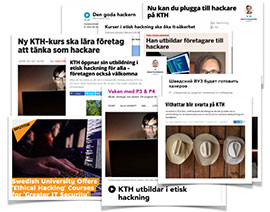Online Course in Ethical Hacking 7,5 hp
In this course, students learn ethical hacking in order audit and improve the cybersecurity of computer networks. At the start of the course, students are confronted with a (rigged) corporate network environment. The objective is to penetrate the network and exfiltrate valuable information. This will require exploiting vulnerabilities, installing trojans, dumping hashes, cracking passwords, breaching firewalls, spoofing servers, cracking wifi networks, and more.

KTH Contract teaching – Uppdragsutbildning
Dates: 1 September – 5 December 2025
Expected workload: 15h/week.
Cost: 25 000 SEK. Your employer will be charged for the course.
Credits: 7,5 credits are awarded in the LADOK system.
Where: Student-controlled schedule. No physical meetings, you can enjoy the course wherever in the world.
Note: Contract teaching is only available through your employer. The couse is not available to private persons.
Register here by 31 July
Read about the course in the media

Han utbildar företagare till hackare (DI)
Vithattar blir svarta på KTH (Voister)
Kurser i etisk hackning ska öka it-säkerhet (Radio P1 Ekot)
Den goda hackern (Radio P1 Uppkopplad)
KTH öppnar sin utbildning i etisk hackning – företagen också välkomna (Computer Sweden)
Ny KTH-kurs ska lära företag att tänka som hackare (Ny Teknik)
Nu kan du plugga till hackare på KTH (Computer Sweden)
KTH utbildar i etisk hackning (Radio P3)
Swedish University Offers ‘Ethical Hacking' Courses for 'Greater IT Security' (Sputnik news)
Шведский ВУЗ будет готовить хакеров (Kompravda)
Learning Objectives
After passing the course, the student should, at an introductory level, be able to
- establish resources to support offensive security operations
- perform reconnaissance and discovery to plan operations
- access credentials, such as account names, passwords and access tokens
- achieve initial access to networks and systems
- execute malicious code on remote devices
- establish command and control capabilities to communicate with compromised systems
- elevate privileges on systems to gain higher-level permissions
- persist on networks by maintaining access across interruptions
- move laterally, pivoting through the computing environment
- avoid detection by network defenders
- collect and exfiltrate data from computing environments
- assess the security of computer systems, applications, and services
- carry out legal and ethical security testing.
This will provide students with a practical understanding of the capabilities and possibilities of an attacker, in order to evaluate the cybersecurity of computer networks.
Guest Lectures
In addition to the course material available exclusively to students, we also offer a set of guest lectures. In 2024, those were as follows:
Mattias Wåhlén, Threat Intelligence Expert at Truesec
The World of Cybercriminals
September 15, 10:15-12:00
F1 (Alfvénsalen), Lindstedtsvägen 22, KTH Campus
Johan Berggren, Staff Security Engineer, Google
Incident Response & Digital Forensics at Google
September 22, 10:15-12:00
F1 (Alfvénsalen), Lindstedtsvägen 22, KTH Campus
Staff from the Swedish Security Service
Ethical hacking at the Swedish Security Service
September 29, 10:15-12:00
F1 (Alfvénsalen), Lindstedtsvägen 22, KTH Campus
Anne-Marie Eklund Löwinder, Founder and CEO Amelsec
The rise and shine of cyber security in Sweden
October 6, 13:15-15:00
F1 (Alfvénsalen), Lindstedtsvägen 22, KTH Campus
Prerequisites
As a prerequisite, participants are expected to have basic programming skills. Knowledge about operating systems (Linux in particular) and communication networks is also strongly recommended. No previous experience of information security is required.
Language
All material is in English, but teachers are also fluent in Swedish.
Reviews from former students
Need more information?
This is how the course is organized
Questions?
Please contact Pontus Johnson



